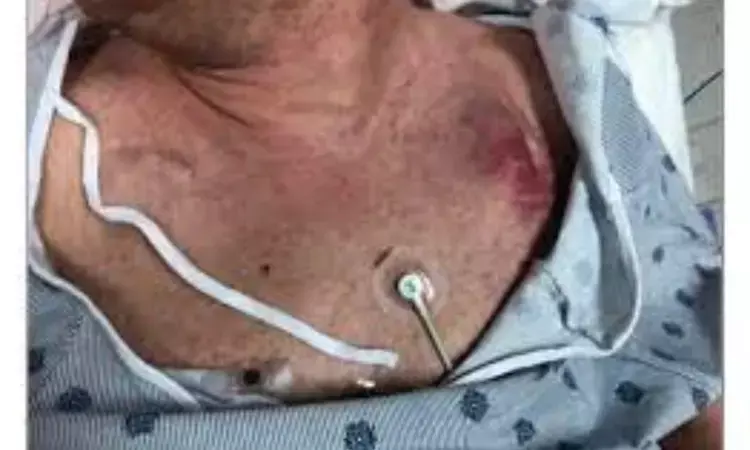- Home
- Medical news & Guidelines
- Anesthesiology
- Cardiology and CTVS
- Critical Care
- Dentistry
- Dermatology
- Diabetes and Endocrinology
- ENT
- Gastroenterology
- Medicine
- Nephrology
- Neurology
- Obstretics-Gynaecology
- Oncology
- Ophthalmology
- Orthopaedics
- Pediatrics-Neonatology
- Psychiatry
- Pulmonology
- Radiology
- Surgery
- Urology
- Laboratory Medicine
- Diet
- Nursing
- Paramedical
- Physiotherapy
- Health news
- Fact Check
- Bone Health Fact Check
- Brain Health Fact Check
- Cancer Related Fact Check
- Child Care Fact Check
- Dental and oral health fact check
- Diabetes and metabolic health fact check
- Diet and Nutrition Fact Check
- Eye and ENT Care Fact Check
- Fitness fact check
- Gut health fact check
- Heart health fact check
- Kidney health fact check
- Medical education fact check
- Men's health fact check
- Respiratory fact check
- Skin and hair care fact check
- Vaccine and Immunization fact check
- Women's health fact check
- AYUSH
- State News
- Andaman and Nicobar Islands
- Andhra Pradesh
- Arunachal Pradesh
- Assam
- Bihar
- Chandigarh
- Chattisgarh
- Dadra and Nagar Haveli
- Daman and Diu
- Delhi
- Goa
- Gujarat
- Haryana
- Himachal Pradesh
- Jammu & Kashmir
- Jharkhand
- Karnataka
- Kerala
- Ladakh
- Lakshadweep
- Madhya Pradesh
- Maharashtra
- Manipur
- Meghalaya
- Mizoram
- Nagaland
- Odisha
- Puducherry
- Punjab
- Rajasthan
- Sikkim
- Tamil Nadu
- Telangana
- Tripura
- Uttar Pradesh
- Uttrakhand
- West Bengal
- Medical Education
- Industry
Percutaneous Mechanical Aspiration Shows Promise in Treating Right-Heart Infective Endocarditis: Study

USA: A recent study focusing on the outcomes of percutaneous mechanical aspiration (PMA) in treating right-sided infective endocarditis (RSIE) has revealed key insights into the clinical profile of these patients and their response to treatment. Right-sided infective endocarditis, though less common than its left-sided counterpart, is associated with a higher rate of pulmonary septic emboli, posing significant treatment challenges.
The multicenter, retrospective CLEAR-IE study, presented at Transcatheter Cardiovascular Therapeutics (TCT) 2024, compared patients with RSIE undergoing surgery to those with left-sided infective endocarditis (LSIE). It found that patients undergoing surgery for right-sided infective endocarditis had a higher incidence of pulmonary septic emboli, more frequent Staphylococcus aureus infections, and larger vegetation compared to those with left-sided infective endocarditis.
Percutaneous mechanical aspiration, a minimally invasive procedure, was utilized in treating RSIE patients to drain infected material and reduce the size of vegetations, thereby improving the patient’s prognosis. The technique has gained attention as an alternative to more invasive surgeries, offering potential benefits such as reduced recovery times and less trauma to the patient.
The incidence of RSIE has been rising, largely due to the global increase in intravenous drug use (IVDU) and the growing use of implantable cardiac devices and central venous catheters. Considering this, Sabbagh, Mayo Clinic, Jacksonville, FL, and colleagues aimed to examine the differences in clinical presentation, microbiological findings, and prognosis between patients undergoing surgery for right-sided infective endocarditis and those with left-sided infective endocarditis.
For this purpose, the researchers retrospectively analyzed relevant clinical data from 432 consecutive patients who underwent valve surgery for infective endocarditis (IE) at their institution between January 2009 and December 2018. The data collected included patients' demographics, preoperative comorbidities, IE manifestations based on the recently modified Duke Criteria, perioperative information, and key clinical outcomes.
The following were the key findings of the study:
• Surgery for Infective Endocarditis:
• 93.3% of patients underwent surgery for left-sided infective endocarditis (LSIE).
• 6.7% of patients underwent surgery for right-sided infective endocarditis (RSIE).
• 11 RSIE patients (37.9%) had a concomitant left-sided infection.
• Demographic and Comorbidity Differences:
• RSIE patients were significantly younger (47.5 years versus 65.1 years for LSIE).
• RSIE patients had fewer comorbidities:
• Hypertension: 41.4% in RSIE vs. 65.3% in LSIE.
• Coronary artery disease: 6.9% in RSIE versus 29.0% in LSIE.
• Risk Factors and Infections:
• RSIE patients had higher rates of:
• Intravenous drug use (IVDU): 34.5% versus 4.5% in LSIE.
• Human immunodeficiency virus (HIV): 10.3% versus 1.7% in LSIE.
• Hepatitis C virus (HCV) infection: 24.1% vs. 5.2% in LSIE.
• Microbiological Findings:
• The proportion of Staphylococcus aureus infections was higher in RSIE (37.9%) compared to LSIE (21.1%).
• 30-Day Mortality:
• 30-day mortality after surgery:
• RSIE: 6.9%.
• LSIE: 14.6%.
"Larger, multicenter prospective studies are required to gather more reliable data on the clinical profiles of these patients, helping to establish the most effective surgical management strategies," the researchers concluded.
Reference:
El Sabbagh A. Outcomes of percutaneous mechanical aspiration of right-sided infective endocarditis. Presented at: TCT 2024. October 30, 2024. Washington, DC.
Dr Kamal Kant Kohli-MBBS, DTCD- a chest specialist with more than 30 years of practice and a flair for writing clinical articles, Dr Kamal Kant Kohli joined Medical Dialogues as a Chief Editor of Medical News. Besides writing articles, as an editor, he proofreads and verifies all the medical content published on Medical Dialogues including those coming from journals, studies,medical conferences,guidelines etc. Email: drkohli@medicaldialogues.in. Contact no. 011-43720751


